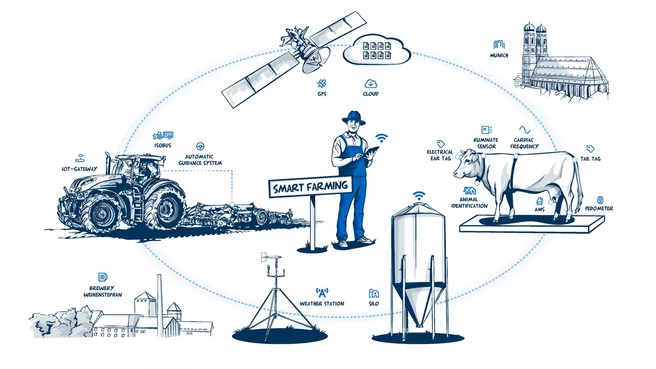Why is the topic of "Smart Farming" more relevant than ever - and what is it all about?
"Smart Farming" and digital transformation in agriculture are quite big buzzwords. They describe the idea of making all digital technologies and innovations usable for agriculture – an incredibly exciting task. The goal must be to make agriculture more efficient, more resilient, more resource-efficient and even more sustainable. Technologies offer us powerful tools for this, but can only be successful in the long-term, if they are seamlessly integrated into everyday work.
Moreover, when it comes to "Smart Farming," terms are not always neatly delineated. This is where our certificate program comes in: We provide precise language and in-depth understanding of the latest research findings. And we show how implementation in practice can succeed.
What role does IoT play for the agricultural sector - is the technology underestimated?
Perhaps not underestimated, but not sufficiently implemented: A lot has happened in the area of control technology: GNSS and automatic steering systems ensure that agricultural machinery can move around the field with an accuracy of 2-3 cm, part-width section control and variable rate control ensure that strong and healthy crops can grow on each individual subplot.
However, many such systems are still "old-shool" from a technical point of view: sensor figures on the grain silo, for example, often still have to be identified manually and transferred to handwritten notes or Excel lists.
The challenge is to connect these systems to the IoT. This will make them faster and easier to use, and processes that currently take up a lot of farmers' time can be automated in the background so that they can devote their attention to the areas of the farm where their expertise is most needed.
How did the idea for the certificate come about?
After studying agricultural sciences, we realized in our daily work that we lacked a "toolbox" to master the digitalization of agriculture: concrete skills such as handling a drone, creating application maps or setting up a sensor system in the field - but also soft skills such as communication between agricultural engineers, software developers and product managers.
The idea for the certificate course was born when we realized that many former fellow students, colleagues from partner companies and local authorities and governments are facing similar problems. The goal of the course and our greatest concern is therefore to make this knowledge about Smart Farming and the digital transformation possibilities of agriculture available to all interested parties in a compact form – based on cutting-edge research findings, practice- as well as future-oriented.
Can you give us an overview of the content within the certificate course?
First, we establish a precise language on the important concepts of digital transformation in agriculture. Then, there is an overview of the important technologies and developments, for example robotics and drone use, GNSS (GPS) systems and automatic guidance systems or Farm Management Information Systems.
Following this, the course centers around IoT. This focus differentiates us from other courses existing in the market. The idea is: How can all the information a farmer needs be processed from all data sources in the physical and digital world? How can it be brought together in a central display? And how can this be used as a basis for automating processes in agriculture?
Participants will build their own IoT system through hands-on exercises, from selecting a sensor to programming a microcontroller to creating a dashboard with a convenient user interface.
And finally: What will the agricultural sector look like in 2051?
Essentially, agriculture in 2051 will revolve around four central aspects. Agriculture will become even more sustainable: thanks to smart machine concepts and new cultivation methods, productivity and biodiversity of an agricultural system will not be opposites. The landscape will change: New concepts will allow spot farming, where the needs of the crop are perfectly met, while leaving room for biotopes.
Farming is getting smarter: satellite data will be even easier to use in information gathering and processing. Data processing systems and AI will support farmers in their decisions, based on algorithms, the latest scientific models and live data.
Farmers are at the center of agriculture – but in a different way: their expertise is needed more than ever. They readjust systems when technology detects irregularities. To be able to intervene, they need not only a sound understanding of their profession but also a knowledge of the technologies – in line with the principle of "lifelong learning", continuous training and education is becoming increasingly important.
Further information:
Chair of Agricultural Sytems Engineering
Registration for the certificate course
TUM Institute for LifeLong Learning
Editing:
Susanne Neumann
TUM School of Life Sciences
Press and Public Relations
Contact to the article:
Elisabeth Heiß
TUM Institute for LifeLong Learning
Marketing & Communications Manager
Phone: +49 89 289-26710
elisabeth.heiss@tum.de
